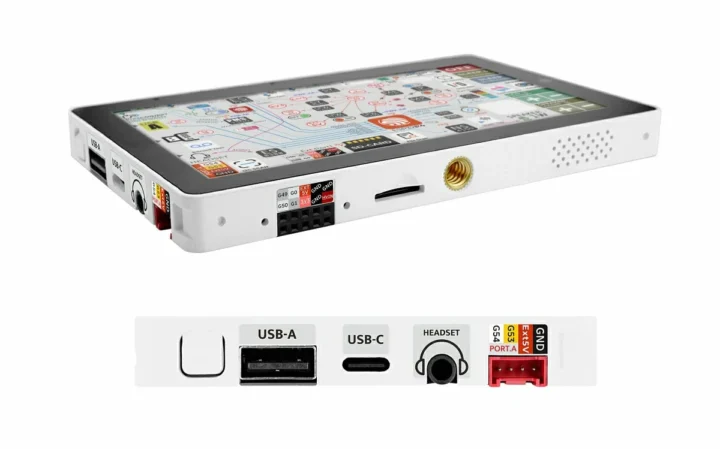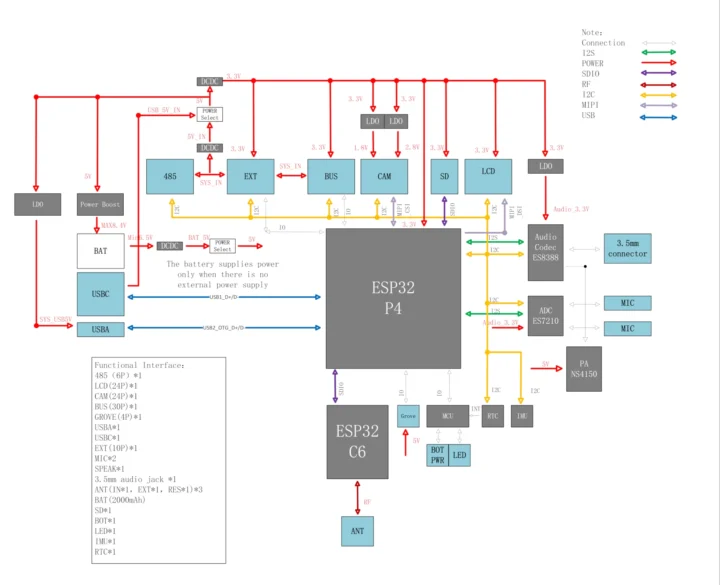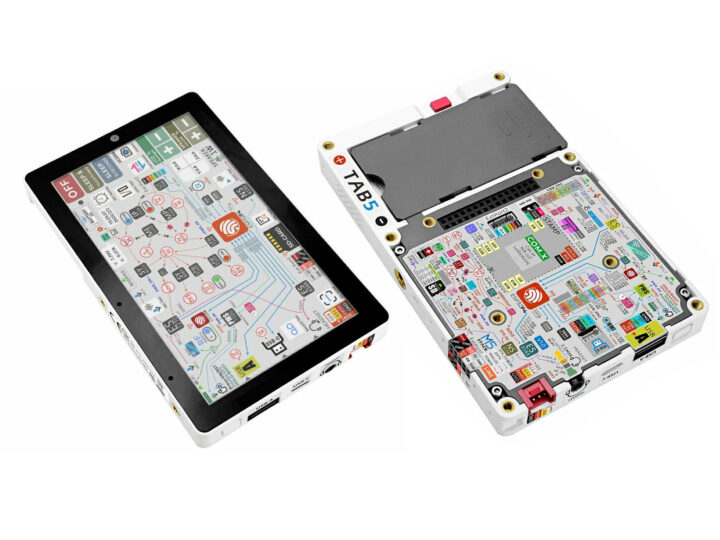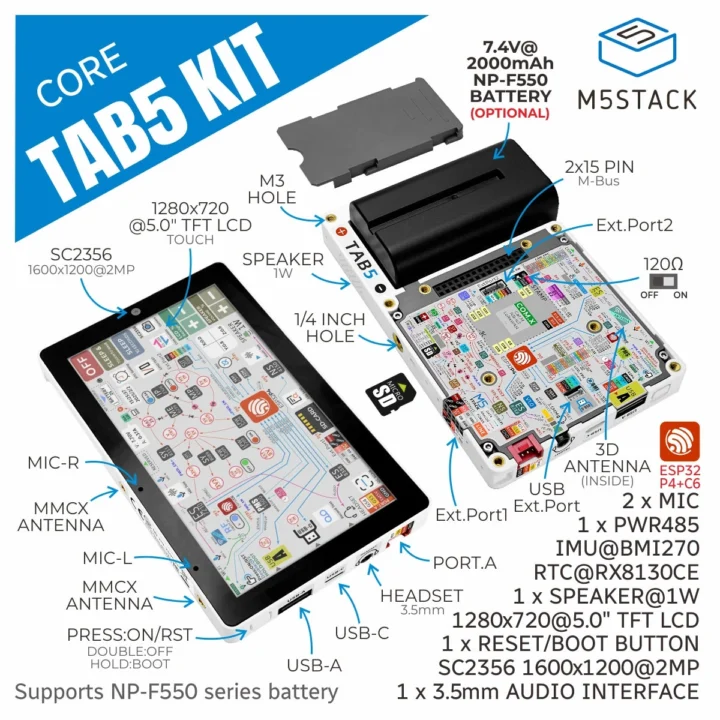The M5Stack Tab5 may look like a small tablet, but it’s an ESP32-P4 IoT development kit with a 5-inch touchscreen display, a 2MP front-facing camera, an ESP32-C6 WiFi 6, Bluetooth, and 802.15.4 wireless module, and a range of interfaces.
Those include USB Type-A and Type-C ports, an RS485 interface, a STAMP pad to connect an LTE Cat M/NB-IoT or LoRaWAN module, and expansion connectors including a Grove module, a 30-pin M5Bus header, and a GPIO_EXT connector. The Tab5 is also equipped with a built-in speaker and dual-microphone array, and the ESP32-P4 development kit is powered by a removable battery with charging support.
M5Stack Tab5 specifications:
- Microcontroller – Espressif Systems ESP32-P4NRW32
- CPU
- Dual-core 32-bit RISC-V HP (High-performance) CPU @ up to 400 MHz with AI instructions extension and single-precision FPU
- Single-RISC-V LP (Low-power) MCU core @ up to 40 MHz with 8KB of zero-wait TCM RAM
- Memory
- 768 KB HP L2MEM (for dual-core CPU), 32 KB LP SRAM, 8 KB TCM (for LP MCU core)
- 32MB PSRAM
- Storage – 128 KB HP ROM, 16 KB LP ROM
- GPU – 2D Pixel Processing Accelerator (PPA)
- VPU – H.264 and JPEG codecs support
- CPU
- Storage
- 16MB flash
- MicroSD card slot
- Display – 5-inch IPS TFT (1280×720) dispplay with GT911 multi-touch controller (I²C)
- Camera – 2 MP (1600×1200) SC2356 MIPI CSI camera module
- Audio
- ES8388 codec; ES7210 AEC front end
- Dual-mic system (AEC echo cancellation)
- 1 W @ 8 Ω NS4150B Speaker
- 3.5mm headphone Jack
- Wireless
- ESP32-C6-MINI-1U module for WiFi 6, Bluetooth 5, and 802.15.4 (Zigbee/Thread/Matter) connectivity with external antenna
- STAMP pad for LTE Cat.M, NB-IoT, or LoRaWAN module
- Antenna – Built-in 3D antenna & MMCX external antenna port
- USB – USB Type-A host port, USB 2.0 Type-C OTG port
- Serial – RS485 interface via SIT3088 14Mbps transceiver and switchable 120 Ω termination
- Sensor – 6-axis BMI270 accel + gyro with interrupt wakeup
- Expansion
- 4-pin Grove connector
- 30-pin M5BUS connector
- GPIO_EXT header
- Misc
- Reset/Boot Button
- RX8130CE real-time clock (RTC) with interrupt wakeup
- Power Management
- 5V via USB-C for charging
- 7.4 V, 2000 mAh (14.8 Wh) 2S NP-F550 removable Li-ion battery,
- IP2326 charging controller
- INA226 bus current/voltage monitoring chip
- Dimensions and weight
- Tab5 – 128.0 x 80.0 x 12.0 mm | 124 grans
- Tab5 Kit – 128.0 × 80.0 × 26.7 mm | 277.4 grams
 As you can see from the specifications above, two variants of the devkit are available: the Tab5 Kit with a built-in removable 2S NP-F550 Li-ion battery, and the standard Tab5, which requires an external power or a separately purchased battery.
As you can see from the specifications above, two variants of the devkit are available: the Tab5 Kit with a built-in removable 2S NP-F550 Li-ion battery, and the standard Tab5, which requires an external power or a separately purchased battery.
M5Stack only mentions the ESP-IDF Framework for development, and there’s no mention about Arduino support like on the GUITION JC1060P470C ESP32-P4 wireless display we covered earlier this week. The Tab5 ships preloaded with an interesting GUI demo giving access to all features (see video embedded at the end of the post) and whose source code can be found on GitHub. The documentation website has more details about the hardware and firmware.

Target applications include Smart home control, remote monitoring systems, IoT device development, and industrial automation.
M5Stack sells the Tab5 for $55 or $60 on AliExpress and its online store, with the price depending on whether you need the battery. It might also be listed on the company’s Amazon store later on. It’s been a while since I’ve played around with ESP32 hardware, and I’m expecting a review sample of the Tab5 next week. That should be interesting.
Meet Tab5, your next-gen smart terminal with ESP32-P4
Tab5 is a versatile, portable IoT development terminal designed for industrial control, smart home hubs, edge AI, and IoT applications.
Limited stock available:https://t.co/106iHoRrPhttps://t.co/VlJ5rBCKzT#m5stack pic.twitter.com/xSMO4eIpNI— M5Stack (@M5Stack) May 9, 2025

Jean-Luc started CNX Software in 2010 as a part-time endeavor, before quitting his job as a software engineering manager, and starting to write daily news, and reviews full time later in 2011.
Support CNX Software! Donate via cryptocurrencies, become a Patron on Patreon, or purchase goods on Amazon or Aliexpress







It is funny that the ESP32-P4 datasheet is still not publicly available, but dev boards based on the same chip keep popping up every now and then.